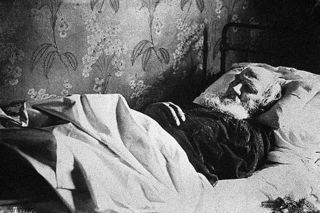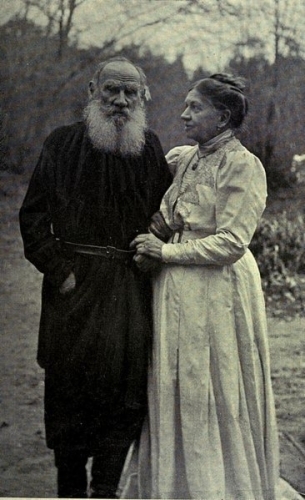Getting to grips with Tolstoy
I have been spending the weekend some way off my usual patch. When my editor Peter Carson died in January, he had just finished, literally the day before he died, translating Tolstoy's Death of Ivan Ilych and Confession for a US publisher (Norton). It will come out later in the year and I am to write the Introduction.
Don't worry, I am not getting above myself. There is also to be a more specialist essay from a Russian expert. My job is to set the scene -- and also to celebrate, and discuss, Peter's role as translator (on which I have quite a lot of interesting stuff). All the same I thought I needed to do a bit more background work on books concerned and their author. Up to now, my knowledge of Tolstoy has been like many people's I imagine: that is to say, some familiarity with War and Peace and Anna Karenina, and rather less interest in the spiritual, pacificist, social reformer that came later -- in the period when both Ilych and Confession were written.
So I've done a day and half's immersion therapy (with more to come), and of course -- as always happens -- I have begun to regret that I haven't been more interested in all this before.
It's not just that Tolstoy's spiritual journey is rather more intriguing than I expected; though that is part of it. For those that know the book, I am (for example) increasingly surprised that most critics (not all, to be fair) seem to take Confession as a pretty transparent autobiographical account of Tolstoy's spiritual struggles -- when the more I read it against The Death of Ivan Ilyich (and Anna Karenina), the more highly crafted, literary construction it comes to seem.
But I'm most of all gobsmacked by the degree of Tolstoy's celebrity in his later years and the wealth of evidence there is for his life (and death) then. I did, sort of know, about the story of him leaving home in 1910, and abandoning the wife, and then dying on the railway station a few days later at the age of 82. But I hadn't quite realised what a media circus it all was -- or that (quite apart from modern cinema recreations, like The Last Station) so much original film footage had survived, including the death bed and funeral.
And I hadn't quite known of the real life, terrible scenes when his wife was kept out of the room where Tolstoy was, and forced to try to peer in through the window -- until they finally let her in when the old man was already unconscious.
Though I guess that is appropriate enough that a writer who was so preoccupied with death, dying and the impact of death's inevitability on the meaning, should himself have had such a baroque end. I'm now trying to figure how this all goes together with Ivan Ilych and Peter's death too.
***********
On quite another topic, and excuse a family advert, the son has been writing on video games in the Arab world, a more curious subject than you might imagine: click here.
Mary Beard's Blog
- Mary Beard's profile
- 4070 followers





